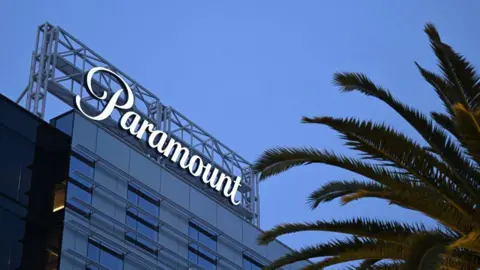The recent approval of an $8 billion merger between Paramount Global and Skydance Media by the U.S. Federal Communications Commission (FCC) marks a significant shift in the landscape of media ownership in Hollywood. This merger, conceived in 2024, blends the legacy of one of the oldest film studios, Paramount, with the innovative approaches of Skydance Media, a growing force in the industry.
The announcement of this merger comes on the heels of a noteworthy settlement within the realm of U.S. politics, where Paramount Global agreed to pay $16 million to resolve a legal dispute with former President Donald Trump regarding the editing of a segment on CBS’s 60 Minutes program featuring Kamala Harris, the former Vice President. Interestingly, the settlement did not necessitate any apology or regret from Paramount, underscoring the complex interplay between media, politics, and corporate interests.
The FCC’s approval, publicly declared by Brendan Carr, chair of the Commission and an appointee of President Trump, signals the agency’s endorsement of the merger. This decision was expected, particularly following Paramount’s legal maneuvering to settle the dispute with Trump. Carr articulated the need for a shift in media trust, stating that “Americans no longer trust the legacy national news media to report fully, accurately, and fairly” and expressed hope for the changes Skydance could bring to CBS.
As both companies anticipate finalizing the merger by August 7, they are prepared for significant adjustments, especially with regard to CBS. The FCC has consented to the transfer of broadcast licenses for 28 CBS-owned stations to the merged entity, facilitating a fresh start under new ownership.
Skydance Media has made public commitments to pursuing unbiased journalism, along with the contentious promise to dissolve diversity, equity, and inclusion initiatives that have been focal points in contemporary corporate discussions. This pledge was met with skepticism by some, including FCC Commissioner Anna Gomez, who dissented against the merger’s approval, suggesting that the decision could come at a cost to the American public’s interests.
The historical backdrop of Paramount Global is rich, tracing its origins to the establishment of Paramount Pictures Corporation in 1914. The studio has released critically acclaimed films and is known for its extensive portfolio that includes Paramount+, CBS, Nickelodeon, and other notable brands. However, the last decade has been challenging for Paramount as it has struggled to maintain its standing amid changing market dynamics.
Skydance, under the stewardship of CEO David Ellison, who is notably the son of Oracle co-founder Larry Ellison, has carved out a niche in producing blockbuster films and has significantly influenced the entertainment sector’s evolution. The consolidation with Paramount indicates an innovative strategy to navigate challenges in an industry that is under constant transformation.
The FCC’s approval was deemed pivotal for the merger’s progression and signifies a trend towards consolidating media power in a landscape where comprehensive ownership can provide significant leverage in market influence. Both the Wall Street Journal and the New York Times have indicated that the settlement with Trump was strategically timed to not disrupt the merger’s progression, unveiling the intricate links between media operations and political considerations.
Furthermore, just days prior to this merger’s approval, Paramount-owned CBS announced the cancellation of “The Late Show with Stephen Colbert,” marking the end of an era. CBS claimed this move was purely based on financial considerations, not a reflection of Colbert’s performance or content. The announcement seems to reflect broader industry challenges within late-night television.
In summary, the merger between Paramount Global and Skydance Media heralds a new chapter in the media landscape, marked by both uncertainty and potential opportunity. As these two entities converge, the implications for content creation, corporate governance, and media ethics will undoubtedly unfold in the coming months, shaping how audiences engage with media in an increasingly polarized environment.












